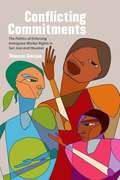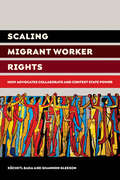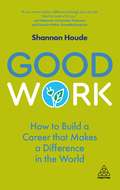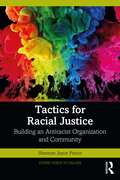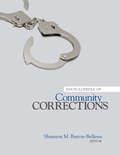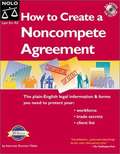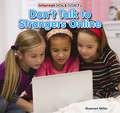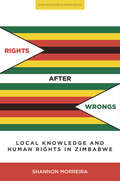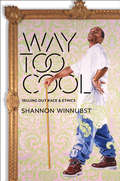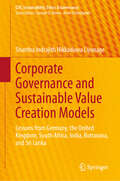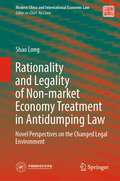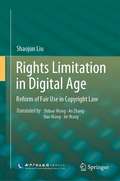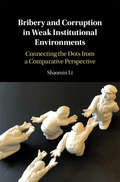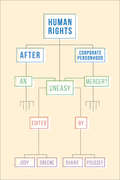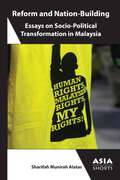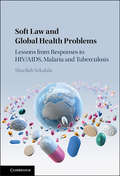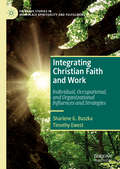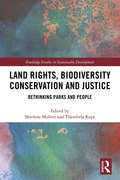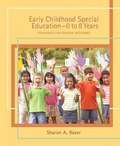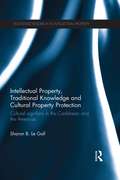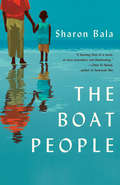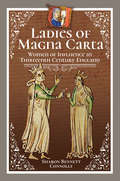- Table View
- List View
Conflicting Commitments
by Shannon GleesonIn Conflicting Commitments, Shannon Gleeson goes beyond the debate over federal immigration policy to examine the complicated terrain of immigrant worker rights. Federal law requires that basic labor standards apply to all workers, yet this principle clashes with increasingly restrictive immigration laws and creates a confusing bureaucratic terrain for local policymakers and labor advocates. Gleeson examines this issue in two of the largest immigrant gateways in the country: San Jose, California, and Houston, Texas. Conflicting Commitments reveals two cities with very different approaches to addressing the exploitation of immigrant workers-both involving the strategic coordination of a range of bureaucratic brokers, but in strikingly different ways. Drawing on the real life accounts of ordinary workers, federal, state, and local government officials, community organizers, and consular staff, Gleeson argues that local political contexts matter for protecting undocumented workers in particular. Providing a rich description of the bureaucratic minefields of labor law, and the explosive politics of immigrant rights, Gleeson shows how the lessons learned from San Jose and Houston can inform models for upholding labor and human rights in the United States.
Scaling Migrant Worker Rights: How Advocates Collaborate and Contest State Power
by Shannon GleesonA free ebook version of this title is available through Luminos, University of California Press’s Open Access publishing program. Visit www.luminosoa.org to learn more. As international migration continues to rise, sending states play an integral part in "managing" their diasporas, in some cases even stepping in to protect their citizens' labor and human rights in receiving states. At the same time, meso-level institutions—including labor unions, worker centers, legal aid groups, and other immigrant advocates—are among the most visible actors holding governments of immigrant destinations accountable at the local level. The potential for a functional immigrant worker rights regime, therefore, advocates to imagine a portable, universal system of justice and human rights, while simultaneously leaning on the bureaucratic minutiae of local enforcement. Taking Mexico and the United States as entry points, Scaling Migrant Worker Rights analyzes how an array of organizations put tactical pressure on government bureaucracies to holistically defend migrant rights. The result is a nuanced, multilayered picture of the impediments to and potential realization of migrant worker rights.
Good Work: How to Build a Career that Makes a Difference in the World
by Shannon HoudeDo you want to have a positive impact on the world? Do you want to have a successful career that makes a difference? In short... do you want to do Good Work? Let this step-by-step guide show you how. Packed with useful tools and exercises, this step-by-step guide will help you figure out your passion and purpose, and how to effectively harness it to make real and positive change - on the world, and on your career. Whether you want to battle climate change, promote diversity and inclusion, work in sustainability - or if you're not sure, but just want to leave things a little better at the end of every work day - let this book support you in turning that passion into action. Written by corporate responsibility consultant and certified coach Shannon Houde, this book is part career guide and part job search help - and all purpose-driven. From understanding what the 'purpose economy' is and how you fit into it, to what jobs to go for and how to land them, Good Work is the helping hand you need to make a career out of changing the world.
Tactics for Racial Justice: Building an Antiracist Organization and Community (Giving Voice to Values)
by Shannon Joyce PrinceThis is not a book of antiracist theory but antiracist tactics – tactics that anyone, of any race, can use to strike a blow against injustice. Antiracism is not about what we feel but what we do, and there are specific techniques we can use to create a just world. Antiracist strategies are skills that can be learned just as we learn skills for public speaking or hitting a baseball. In these pages, you – whether a person of color or white – will find a playbook for leading your workplace, organization, or community through transformative change in the wake of an act of explicit racism. You’ll learn to play antiracist rhetorical chess, and to anticipate and effectively respond to the discursive moves of people who don’t understand bigotry, aren’t aware of it, are in denial of it, or even actively uphold it – so that you can advance justice goals. You’ll get a blueprint of how to dismantle systemic racism community by community, workplace by workplace, and organization by organization – and examples of what not to do. This book is aimed at people who are conscious of the reality of racism and want to end it but may not know how. It clearly shows how anyone can make an effective, significant, and measurable impact on racism through strategic action.
Encyclopedia of Community Corrections
by Shannon M. Barton-BellessaIn response to recognition in the late 1960s and early 1970s that traditional incarceration was not working, alternatives to standard prison settings were sought and developed. One of those alternatives—community-based corrections—had been conceived in the 1950s as a system that might prove more progressive, humane, and effective, particularly with people who had committed less serious criminal offenses and for whom incarceration, with constant exposure to serious offenders and career criminals, might prove more damaging than rehabilitative. The alternative of community corrections has evolved to become a substantial part of the criminal justice and correctional system, spurred in recent years not so much by a progressive, humane philosophy as by dramatically increasing prison populations, court orders to "fix" overextended prison settings, and an economic search for cost savings. Although community correction programs have been in place for some 40 years now, to date no comprehensive reference resource has tackled this topic. Accessible and jargon-free and available in both print and electronic formats, the one-volume Encyclopedia of Community Corrections will explore all aspects of community corrections, from its philosophical foundation to its current inception.Features & Benefits:150 signed entries (each with Cross References and Further Readings) are organized in A-to-Z fashion to give students easy access to the full range of topics in community corrections.A thematic Reader's Guide in the front matter groups entries by broad topical or thematic areas to make it easy for users to find related entries at a glance.In the electronic version, the Reader's Guide combines with a detailed Index and the Cross References to provide users with convenient search-and-browse capacities.A Chronology in the back matter helps students put individual events into broader historical context.A Glossary provides students with concise definitions to key terms in the field.A Resource Guide to classic books, journals, and web sites (along with the Further Readings accompanying each entry) guides students to further resources in their research journeys.An Appendix offers statistics from the Bureau of Justice.
How to Create a Noncompete Agreement
by Shannon MieheHow to Create a Noncompete Agreement provides readers with the step-by-step instructions they need to prevent former employees from: starting a competing business; working for a competitor; soliciting their customers; recruiting their employees; disclosing confidential information. Provides the forms (as tear-outs) needed to write noncompete agreements. Includes information on making effective agreements in states where a noncompete may be unenforceable.
Don't Share Your Address Online (Internet Dos & Don'ts)
by Shannon MillerIt is smart to be safe online by keeping facts about yourself private. This book will tell you how.
Don't Talk to Strangers Online (Internet Dos & Don'ts)
by Shannon MillerThis book briefs you on online safety and warns against talking to strangers online.
Rights After Wrongs: Local Knowledge and Human Rights in Zimbabwe
by Shannon MorreiraThe international legal framework of human rights presents itself as universal. But rights do not exist as a mere framework; they are enacted, practiced, and debated in local contexts. Rights After Wrongs ethnographically explores the chasm between the ideals and the practice of human rights. Specifically, it shows where the sweeping colonial logics of Western law meets the lived experiences, accumulated histories, and humanitarian debts present in post-colonial Zimbabwe. Through a comprehensive survey of human rights scholarship, Shannon Morreira explores the ways in which the global framework of human rights is locally interpreted, constituted, and contested in Harare, Zimbabwe, and Musina and Cape Town, South Africa. Presenting the stories of those who lived through the violent struggles of the past decades, Morreira shows how supposedly universal ideals become localized in the context of post-colonial Southern Africa. Rights After Wrongs uncovers the disconnect between the ways human rights appear on paper and the ways in which it is possible for people to use and understand them in everyday life.
Way Too Cool
by Shannon WinnubstLife, liberty, and the pursuit of cool have informed the American ethos since at least the 1970s. Whether we strive for it in politics or fashion, cool is big business for those who can sell it across a range of markets and media. Yet the concept wasn't always a popular commodity. Cool began as a potent aesthetic of post-World War II black culture, embodying a very specific, highly charged method of resistance to white supremacy and the globalized exploitation of capital. Way Too Cool follows the hollowing-out of "coolness" in modern American culture and its reflection of a larger evasion of race, racism, and ethics now common in neoliberal society. It revisits such watershed events as the 1960s Civil Rights Movement, second-wave feminism, the emergence of identity politics, 1980s multiculturalism, 1990s rhetorics of diversity and colorblindness, 9/11, and Hurricane Katrina, as well as the contemporaneous developments of rising mass incarceration and legalized same-sex marriage, to pair the perversion of cool with the slow erasure of racial and ethical issues from our social consciousness, which effectively quashes our desire to act ethically and resist abuses of power. The cooler we become, the more indifferent we grow to the question of values, particularly inquiry that spurs protest and conflict. This book sounds an alarm for those who care about preserving our ties to an American tradition of resistance.
Way Too Cool: Selling Out Race and Ethics
by Shannon WinnubstLife, liberty, and the pursuit of cool have informed the American ethos since at least the 1970s. Whether we strive for it in politics or fashion, cool is big business for those who can sell it across a range of markets and media. Yet the concept wasn't always a popular commodity. Cool began as a potent aesthetic of post-World War II black culture, embodying a very specific, highly charged method of resistance to white supremacy and the globalized exploitation of capital.Way Too Cool follows the hollowing-out of "coolness" in modern American culture and its reflection of a larger evasion of race, racism, and ethics now common in neoliberal society. It revisits such watershed events as the 1960s Civil Rights Movement, second-wave feminism, the emergence of identity politics, 1980s multiculturalism, 1990s rhetorics of diversity and colorblindness, 9/11, and Hurricane Katrina, as well as the contemporaneous developments of rising mass incarceration and legalized same-sex marriage. It pairs the perversion of cool with the slow erasure of racial and ethical issues from our social consciousness, which effectively quashes our desire to act ethically and resist abuses of power. The cooler we become, the more indifferent we grow to the question of values, particularly inquiry that spurs protest and conflict. This book sounds an alarm for those who care about preserving our ties to an American tradition of resistance.
Corporate Governance and Sustainable Value Creation Models: Lessons from Germany, the United Kingdom, South Africa, India, Botswana, and Sri Lanka (CSR, Sustainability, Ethics & Governance)
by Shantha Indrajith LiyanageThe contemporary issue of the Anglo-American corporate vale model is short-termism. That is, the model operates in the interest of shareholders overlooking or at a cost of non-shareholder stakeholders’ interests including society and environment. The eye opening evidence is the 2008-09 global financial crisis. In these circumstances, this book examines how three Anglo-American corporate governance jurisdictions, the United Kingdom, South Africa, and India have recently modified their corporate value models for creating long-term sustainable value. The examination continues with the Anglo American corporate value models of two emerging countries also. Finally, the Continental European corporate (German) model is also analyzed. The comparative analysis is useful for revisiting not only the Anglo-Saxon Models in common law countries but also Continental European Models in civil law countries. This book is appropriate for scholars, academics, students, and policy makers who are interested in corporate governance models around the world.
Rationality and Legality of Non-market Economy Treatment in Antidumping Law: Novel Perspectives on the Changed Legal Environment (Modern China and International Economic Law)
by Shao LongThis book serves as a comprehensive study of and provides rich insight into non-market economy treatment, including its past, present, and estimated future practices and implications. It explores the introduction of the market and non-market economy dichotomy into international trade law. It traces the origin and development of non-market economy treatment against changing international economic and political background. The book examines this treatment in light of the rationale underlying anti-dumping, reflecting its alleged significance of ensuring fair trade. It in particular investigates the varied non-market economy treatment practices responding concerns of China’s rising as a large state-led economy, analyzing the deviation of NME treatment into an all-in trade tool. The book argues against preconceived bias and unilateral protectionism. It highlights the universal existence of government involvement in the market and proposes objective assessment of its impact on fair trade. Final proposition of the book is depoliticizing trade, reforming comprehensively international trade rules to carefully calibrate different values, including promoting fairness and enhancing global social welfare. It envisages a multi-dimension overhaul of international trade rules to rebalance trade interests, rather than roughly labeling an economy to confer different treatment, the practices of which lead to separation and chaos. The book is of particular relevance and interest to economies-in-transition, and among policy makers, academicians and legal practitioners engaged in trade remedies and trade rules reconstruction.
Rights Limitation in Digital Age: Reform of Fair Use in Copyright Law
by Shaojun LiuThis book comprehensively discusses the effects of digital technology on the way work is disseminated and the resulting challenges concerning the fair use of copyright. It also analyzes so-called fairness by examining theories on the system of fair use, demonstrating the “system changes that will be brought about by technological changes” from the perspective of economics, i.e., the problem of modification faced by the system of fair use of copyright. Exploring the nature and function of fair use and repositioning the fair use system, the book proposes a better design for China’s system of limitation on copyright and a readjustment of the copyright system. Lastly, in addition to analyzing the reconfigurations of fair use from an economic standpoint, the book describes in detail the interactions between legal systems and cultures.
Bribery and Corruption in Weak Institutional Environments: Connecting the Dots from a Comparative Perspective
by Shaomin LiDrawing on twenty years of research and observations, Li explains how bribery and corruption are carried out in countries with weak institutional environments, and how these activities become globalized. By distinguishing rule-based, relation-based and clan-based governance, this book offers a novel explanation to the age-old puzzle of why some countries thrive despite corruption. It also sheds lights on the symbiotic roles corruption and anticorruption campaigns play in maintaining dictatorships. Applying cost-benefit analysis to different governance environments, Li argues that as non-rule-based economies expand, the transition from relying on private relationships to relying on public rules is inevitable. However, by highlighting the globalization of corruption by non-rule-based countries, this book warns against the potential threats and consequences of bribery by powerful dictatorial governments. This book will appeal to scholars, analysts and graduate students studying corruption, as well as policymakers, business professionals and executives seeking insights into the characteristics of bribery and corruption within different institutional settings.
A Theory of Mediators’ Ethics
by Shapira OmerMany aspects relating to the conduct of mediation are left to mediator choice, but mediators often lack adequate guidance on how their discretion ought to be exercised. In this book, Omer Shapira identifies the ethical norms that govern mediators' conduct. Adopting a professional ethics perspective on the basis of role-morality and applying it to a core definition of mediators' role, Shapira argues that all mediators are placed in ethical relationships with mediation parties, the mediation profession, the public and their employers. or principals that produce ethical obligations. The book goes on to explore the legitimate expectations of these groups and analyzes existing codes of conduct for mediators. Shapira constructs a theory of mediators' ethics that produces a proposed model code of conduct for mediators - a detailed set of norms of mediators' ethics that can be rationally justified and defended with regard to mediators at large.
Human Rights after Corporate Personhood: An Uneasy Merger?
by Sharif YoussefHuman Rights after Corporate Personhood offers a rich overview of current debates, and seeks to transcend the "outrage response" often found in public discourse and corporate legal theory. Through original and innovative analyses, the volume offers an alternative account of corporate juridical personality and its relation to the human, one that departs from accounts offered by public law. In addition, it explores opportunities for the application of legal personality to assist progressive projects, including, but not limited to, environmental justice, animal rights, and Indigenous land claims. Presented accessibly for the benefit of non-specialist readers, the volume offers original arguments and draws on eclectic sources, from law and poetry to fiction and film. At the same time, it is firmly grounded in legal scholarship and, thus, serves as an essential reference for scholars, students, lawmakers, and anyone seeking a better understanding of the interface between corporations and the law in the twenty-first century.
Reform and Nation-Building: Essays on Socio-Political Transformation in Malaysia (Asia Shorts)
by Sharifah Munirah AlatasSince obtaining independence in 1957, Malaysia has had two historic general elections, the first in 2018 and the second in 2022. The 2018 election brought the reformist Pakatan Harapan government into power. Due to both internal and external machinations, the Pakatan Harapan administration collapsed 22 months later. Subsequently, more than two years of socio-political instability ensued, exacerbated by the COVID-19 pandemic, economic hardships, and increasing ethnic polarization and identity politics. After the 2022 election, there was renewed hope. Under the leadership of Prime Minister Anwar Ibrahim, Pakatan Harapan again leads a new coalition government (dubbed the “unity” government). Sharifah Munirah Alatas discusses these developments in a series of short essays. She highlights the peoples’ hopes for crucial reforms and their lingering despair for what seems unattainable. Alatas focuses on the rise in corruption, identity politics, and what she considers the dismal failure of the nation’s public universities. She questions the future of the nation but hopes for a revolutionary change in leadership attitudes.
Soft Law and Global Health Problems: Lessons from Responses to HIV/AIDS, Malaria and Tuberculosis
by Sharifah SekalalaVarious legal approaches have been taken internationally to improve global access to essential medicines for people in developing countries. This book focuses on the millions of people suffering from AIDS, tuberculosis and malaria. Beginning with the AIDS campaign for antiretroviral (ARV) drugs, Sharifah Sekalala argues that a soft law approach is more effective than hard law by critiquing the current TRIPS flexibilities within the World Trade Organization. She then considers how soft law has also been instrumental in the fight against malaria and tuberculosis. Using these compelling case studies, this book explores lawmaking on global health and analyses the viability of current global health financing trends within new and traditional organisations such as the United Nations, the World Health Organization, UNAIDS, UNITAID and The Global Fund. This book is essential reading for legal, development, policy and health scholars, activists and policymakers working across political economy, policy studies and global health studies.
Integrating Christian Faith and Work: Individual, Occupational, and Organizational Influences and Strategies (Palgrave Studies in Workplace Spirituality and Fulfillment)
by Timothy Ewest Sharlene G. BuszkaThough the majority of Americans claim faith in God and adults spend the majority of their time working, these two important dimensions of life are rarely effectively integrated. It is important for people of every faith tradition to consider how, when and if their faith and work are to be integrated. This is especially true as research shows that the integration of faith and spirituality in the workplace results in numerous benefits for individuals, organizations and society - if done respectfully. This book presents key research insights concerning integration influences and strategies for Christians who seek to integrate their faith and their work. Specifically, it discusses how individual, occupational and organizational factors influence faith and work integration, and suggests diverse ways to integrate the Christian faith at work. The Faith and Work Integration Spheres of Influence Model is presented as a tool to guide individuals in better understanding how to develop their own personal plan for faith and work integration within the context of limiting or enabling occupational and organizational factors. It also suggests areas for further research on this topic. Readers will learn how Christian faith and work integration can be maximized based on individual attributes, occupational characteristics, and organizational factors.
Land Rights, Biodiversity Conservation and Justice: Rethinking Parks and People (Routledge Studies in Sustainable Development)
by Sharlene Mollett Thembela KepeIn the context of sustainable development, recent land debates tend to construct two porous camps. On the one side, norms of land justice and their advocates dictate that people’s rights to tenure security are tantamount and even sometimes key to successful conservation practice. On the other hand, biodiversity protection and conservation advocates, supported by global environmental organizations and states, remain committed to conservation strategies, steeped in genetics and biological sciences, working on behalf of a "global" mandate for biodiversity and climate change mitigation. Land Rights, Biodiversity Conservation and Justice seeks to illuminate struggles for land and territory in the context of biodiversity conservation. This edited volume explores the particular ideologies, narratives and practices that are mobilized when the agendas of biodiversity conservation practice meet, clash, and blend with the demands for land and access and control of resources from people living in, and in close proximity to, parks. The book maintains that, while biodiversity conservation is an important goal in a time where climate change is a real threat to human existence, the successful and just future of biodiversity conservation is contingent upon land tenure security for local people. The original research gathered together in this volume will be of considerable interest to researchers of development studies, political ecology, land rights, and conservation.
Early Childhood Special Education (0 to 8 Years): Strategies for Positive Outcomes
by Sharon A. RaverFeaturing the application of evidence-based strategies, ecological and family-based approaches, effective learning, and the use of responsive cultural/linguistic practices, Early Childhood Education (0-8 Years): Strategies for Positive Outcomes, prepares students for all the professional knowledge and skill competencies they need to promote optimal development in infant and toddlers (0-3), preschoolers (3-5), and primary-aged (6-8) children with special needs. Using real-life case studies to illustrate recommended practices, the book clearly presents disability characteristics, assessment practices, and easy-to-implement interventions for inclusive and special education settings, while giving students all the resources they need to master and apply the material. Highlights of This First Edition: Prepares students with ALL the professional knowledge and skill competencies necessary to promote optimal development in children with special needs from birth through 8 years old. Highlights intervention techniques from special education, speech-language pathology, occupational/physical therapy, and the fields of vision and hearing impairments. Uses a real-life case study in each chapter to illustrate recommended practices and strategies. Examines the legal, philosophical, and instructional tenets of the field of Early Childhood Special Education in detail, including IDEA 2004. Features how to use evidence-based practices and strategies that maximize communicative, cognitive/literacy, fine and gross motor, adaptive, and social-emotional development in infants and toddlers, preschoolers, and primary-aged children.
Intellectual Property, Traditional Knowledge and Cultural Property Protection: Cultural Signifiers in the Caribbean and the Americas (Routledge Research in Intellectual Property)
by Sharon B. Le GallInternational developments since the mid-1990s have signalled an awareness of the importance and validity of traditional knowledge and cultural property. The adoption of the Convention on Biological Diversity, and the establishment of the WIPO Intergovernmental Committee on Intellectual Property and Genetic Resources, Traditional Knowledge and Folklore demonstrate an emerging trend towards the recognition of the rights of communities and the importance of culture in shaping international law and policy. This book examines how developments to protect collectively held knowledge transpose to circumstances which may not meet the usually understood criteria of what is considered to be an indigenous or traditional group. This includes communally derived cultural products which have emerged out of communities and subsequently formed a part of the national or popular culture. The book considers the steel pan of Trinidad and Tobago, punta rock music from Belize, Brazilian capoeira, and the cajón of Peru as key cases studies of this. By exploring the impact of past and recent international developments to protect traditional knowledge, Sharon Le Gall highlights a category of cultural signifiers which lies outside the scope of intellectual property protection, as well as the protection proposed for traditional knowledge and advocated for intangible cultural property. The book proposes a reinterpretation of Joseph Raz’s interest theory of group rights in order to accommodate the rights advocated for collectively derived cultural signifiers on the basis of their value as symbols of identity. In doing so, Le Gall offers an original account of how those signifiers, which may not be described as exclusively ‘traditional’ or ‘indigenous’ and held in ways which are not ‘traditional’ or ‘customary’, may be accommodated in emerging traditional knowledge laws.
The Boat People: A Novel
by Sharon BalaFor readers of Khaled Hosseini and Chris Cleave, The Boat People is an extraordinary novel about a group of refugees who survive a perilous ocean voyage only to face the threat of deportation amid accusations of terrorismWhen a rusty cargo ship carrying Mahindan and five hundred fellow refugees from Sri Lanka's bloody civil war reaches Vancouver's shores, the young father thinks he and his six-year-old son can finally start a new life. Instead, the group is thrown into a detention processing center, with government officials and news headlines speculating that among the "boat people" are members of a separatist militant organization responsible for countless suicide attacks—and that these terrorists now pose a threat to Canada's national security. As the refugees become subject to heavy interrogation, Mahindan begins to fear that a desperate act taken in Sri Lanka to fund their escape may now jeopardize his and his son's chance for asylum. Told through the alternating perspectives of Mahindan; his lawyer, Priya, a second-generation Sri Lankan Canadian who reluctantly represents the refugees; and Grace, a third-generation Japanese Canadian adjudicator who must decide Mahindan's fate as evidence mounts against him, The Boat People is a spellbinding and timely novel that provokes a deeply compassionate lens through which to view the current refugee crisis.
Ladies of Magna Carta: Women of Influence in Thirteenth Century England
by Sharon Bennett ConnollyAn innovative take on Magna Carta history that examines the impact and influence of women. 39. No man shall be taken, imprisoned, outlawed, banished or in any way destroyed, nor will we proceed against or prosecute him, except by the lawful judgment of his peers or by the law of the land. This clause in Magna Carta was in response to the appalling imprisonment and starvation of Matilda de Braose, the wife of one of King John&’s barons. Matilda was not the only woman who influenced, or was influenced by, the 1215 Charter of Liberties, now known as Magna Carta. Women from many of the great families of England were affected by the far-reaching legacy of Magna Carta, from their experiences in the civil war and as hostages, to calling on its use to protect their property and rights as widows. Ladies of Magna Carta looks into the relationships—through marriage and blood—of the various noble families and how they were affected by the Barons&’ Wars, Magna Carta, and its aftermath—the bonds that were formed and those that were broken. Including the royal families of England and Scotland, the Marshals, the Warennes, the Braoses, and more, Ladies of Magna Carta focuses on the roles played by the women of the great families whose influences and experiences have reached far beyond the thirteenth century.
